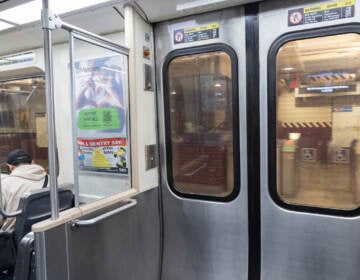Longshoremen show in force

By Linda K. Harris
For PlanPhilly
Longshoremen, of whom about 100 showed up Wednesday night at George Washington Elementary School, can boast of working in a booming industry.
For them, the Central Delaware River is a natural flowing highway for a growing commerce that puts food on the family table and pays college tuition bills.
But the longshoremen showed up in large numbers for the second of three civic engagement forums on the future of the waterfront because they are worried. They’re concerned that condos, casinos and other private development – and add to that recreational bike and hiking paths — will dominate the banks of the Central Delaware, taking up valuable space that could provide room for expansion of the shipping and cargo business that keeps them working. They fear being pushed aside, their good-paying jobs lost, or replaced by lower-paying toil.
“Today, redevelopment means high-rises, condos. They’ve forgotten that the city and this state were built off the Delaware River,” said Boise Butler, president of the International Longshoremen’s Association Local 1291. “The jobs I’m so concerned about are the family-sustaining jobs. I’m concerned about $29-an-hour jobs being replaced by the service industry, which I don’t have anything against, but they’re not the family-sustaining jobs I would like to see grow.”
Both Butler and James Paylor Jr, vice president of the International Longshoremen’s Association AFL-CIO, said larger ships and increased global trade have energized the cargo business, which is poised for even more growth.
“We need a deeper river and more space,” Paylor said. “Here’s what we’re concerned about the casinos. They could create congestion at existing facilities … the next step would be to close us down. They should make it compatible with a working port. Other competing ports are spending billions to update, modernize and expand.”
Paylor said about 45,000 jobs are directly connected to the Philadelphia port industries. In addition to the 1,200 members of the ILA, there are truck drivers, warehouse workers, freight forwarders and brokers, government inspectors and office personnel. And there could be many, many more jobs, he said, if the city invests in developing modern facilities for the port.
“Philadelphia and Baltimore are sitting in a very good position, but they’re not prepared for what is coming,” he said.
Butler said he would like to see businesses, retail stores and warehouses that don’t need the waterfront in order to exist, encouraged to locate somewhere else.
Paylor expressed a similar notion. “They built casinos in the middle of the desert and millions of people came. Why do they have to be on the waterfront?”
Butler said the river is a place where many people can make a good living, but if the banks of the Delaware are filled with casinos and condos, only a relatively few will benefit financially.
“They make a few people richer instead of creating jobs for middle-class people,” Boise said.
Brian Shanahan lives in Whitman and is a member of the ILA. He showed up Wednesday night to give voice to his interests.
“We need to expand and they’re not addressing that issue. They’re looking at bike paths and condos. We need more room to grow if we’re going to be a major port in this country. We want to give our children a chance to have good jobs.”
In the general discussion that followed the smaller group meetings Wednesday, Bill Waffle, an architect from Queen Village, expressed a newfound optimism, based partially on the discussions of Wednesday evening.
When he moved to Philadelphia 12 years ago, he said, he didn’t sense that the city was very dynamic.
“I thought, this is a great place I’ve moved to. Rigor mortis is going to set in next week.”
But now, he said, “the city is returning to the idea of planning. The city is talking about growing.”
State Rep. Bill Keller, who worked 25 years as a member of ILA, said after the public forum that he believed the longshoremen’s concerns were being heard. “I believe from now on, the ILA will have a voice in the process.”
Keller said he wanted to make sure that none of the 45,000 jobs was lost and that the port continued to be able to take advantage of the expanding industry. “We want to get ready so that Philadelphia can get its fair share of that growth.”
Linda K. Harris, a former Inquirer reporter and editor, lives in and writes from South Philadelphia
WHYY is your source for fact-based, in-depth journalism and information. As a nonprofit organization, we rely on financial support from readers like you. Please give today.






